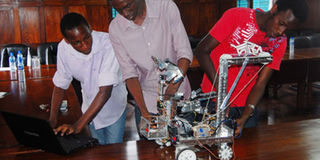S6 students invent robot to find bombs

(L-R) Alvin Kabwama, Nigel Kinyera and David Tusubira, who are in their Senior Six vacation, display the robot that can detect and disarm explosive material at Makerere University yesterday. Photo by Abdu Kiyaga.
What you need to know:
Three St. Mary’s College Kisubi students under the guidance of a Makerere University don have manufacture a device that can detect and defuse explosives.
Necessity is the mother of innovation and this seems to have been the main motivator for an Explosive Ordnance Disposal (EOD) device that Makerere University’s College of Engineering, Design Art and Technology showcased at a press conference yesterday.
The device with capability to detect and defuse explosives is the brainchild of three students about to join university. They are supervised by Mr Cosmas Mwikyirize, a lecturer at the engineering college.
Mr Mwikyirize said the device, still a prototype for development of more effective systems to deal with the threat of terrorism and especially the use of Improvised Explosive Devices (IEDs), usually preferred by terrorists, “was developed from scratch.”
It is the third in a series of other robot prototypes the college has made, including a chemical dispenser robot and an automatic scooter. “We built this robot from scratch, we did not have any blue print to look at,” Mr Mwikyirize said last evening.
The robot runs on 12 motors, censors, and a Central Processing Unit of the tetrix system.
It uses Bluetooth for movement control and Wifi and Wimax for the video field to send signals.
The robot also stands on metallic beams also procured locally.
An outcome of the iLabs@MAK, a project for promotion of innovations, the robot is remotely controlled on a computer to navigate through relatively flat surfaces within a 20 meters radius.
It’s most important advantage is that it minimizes the risk of officers involved in counter-terrorism missions. “The design and construction of the robot was motivated by the need to demonstrate local capacity in the development of technology in the fight against terrorism,” college spokesperson Betty Kyakuwa told journalists at the Vice Chancellors monthly press briefing yesterday.
Brains behind project
Former St Mary’s College, Kisubi students, Alvin Kabwama, David Tusubira and Nigel Kinyera manufactured the prototype.
Last year Makerere’s engineering college unveiled an electronic system for an electronic car, Kiira EV. More recently, the college announced the founding of the Winsenga device for antenatal investigations.
Vice Chancellor Venansius Baryamureeba said it was a great achievement for the university and country. However, Ms Kyakuwa said the public should not be excited by the machine because it is not useful to the country in its current state, but only shows what the university’s’ students are capable of.
“In its present state, it cannot go out to be experimented but only a proof and an inspiration to young people to work harder and realise that there is no limit to their imagination.”
Ms Kyakuwa said the university needs more funding and security partners to advance the robot innovation.



